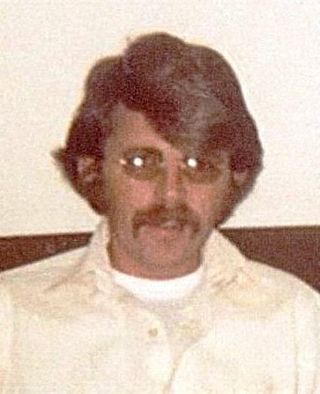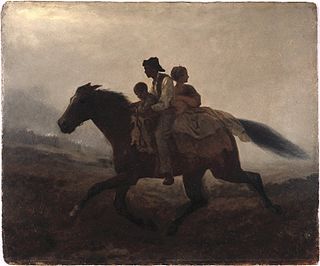Related Research Articles

The United States Marshals Service (USMS) is a federal law enforcement agency in the United States. The Marshals Service serves as the enforcement and security arm of the U.S. federal judiciary, although it is an agency of the U.S. Department of Justice and operates under the direction of the U.S. Attorney General. It is the oldest U.S. federal law enforcement agency, created by the Judiciary Act of 1789 during the presidency of George Washington as the "Office of the United States Marshal". The USMS as it stands today was established in 1969 to provide guidance and assistance to U.S. Marshals throughout the federal judicial districts.

The FBI Ten Most Wanted Fugitives is a most wanted list maintained by the United States's Federal Bureau of Investigation (FBI). The list arose from a conversation held in late 1949 between J. Edgar Hoover, Director of the FBI, and William Kinsey Hutchinson, International News Service editor-in-chief, who were discussing ways to promote capture of the FBI's "toughest guys". This discussion turned into a published article, which received so much positive publicity that on March 14, 1950, the FBI officially announced the list to increase law enforcement's ability to capture dangerous fugitives. The first person added to the list was Thomas J. Holden, a robber and member of the Holden–Keating Gang on the day of the list's inception.

A bounty hunter is a private agent working for a bail bondsman who captures fugitives or criminals for a commission or bounty. The occupation, officially known as a bail enforcement agent or fugitive recovery agent, has traditionally operated outside the legal constraints that govern police officers and other agents of the state. This is because a bail agreement between a defendant and a bail bondsman is essentially a civil contract that is incumbent upon the bondsman to enforce. Since they are not police officers, bounty hunters are exposed to legal liabilities from which agents of the state are protected as these immunities enable police to perform their functions effectively without fear of lawsuits. Everyday citizens approached by a bounty hunter are neither required to answer their questions nor allowed to be detained. Bounty hunters are typically independent contractors paid a commission of the total bail amount that is owed by the fugitive; they provide their own professional liability insurance and only get paid if they are able to find the "skip" and bring them in.
America's Most Wanted is an American television program whose first run was produced by 20th Television, and second run is under the Fox Alternative Entertainment division of Fox Corporation. At the time of its cancellation by the Fox television network in June 2011, it was the longest-running program in the network's history, a mark since surpassed by The Simpsons, although the program was revived ten years later. The show started off as a half-hour program on February 7, 1988. In 1990, the show's format was changed from 30 minutes to 60 minutes. The show's format was reverted to 30 minutes in 1995, and then back to 60 minutes in 1996. A short-lived syndicated spinoff titled America's Most Wanted: Final Justice aired during the 1995–96 season.

A fugitive or runaway is a person who is fleeing from custody, whether it be from jail, a government arrest, government or non-government questioning, vigilante violence, or outraged private individuals. A fugitive from justice, also known as a wanted person, can be a person who is either convicted or accused of a crime and hiding from law enforcement in the state or taking refuge in a different country in order to avoid arrest.

In the United States, fugitive slaves or runaway slaves were terms used in the 18th and 19th centuries to describe people who fled slavery. The term also refers to the federal Fugitive Slave Acts of 1793 and 1850. Such people are also called freedom seekers to avoid implying that the enslaved person had committed a crime and that the slaveholder was the injured party.

The Bureau of Diplomatic Security, commonly known as Diplomatic Security (DS), is the security branch of the United States Department of State. It conducts international investigations, threat analysis, cyber security, counterterrorism, and protection of people, property, and information. Its mission is to provide a safe and secure environment for officials to execute the foreign policy of the United States.

The Diplomatic Security Service (DSS) is the principal law enforcement and security agency of the United States Department of State (DOS). As the operational division of DOS Bureau of Diplomatic Security, its primary mission is to provide security to protect diplomatic assets, personnel, and information, and combat transnational crimes connected to visa and passport fraud. DSS also conducts counterterrorism, counterintelligence, cybersecurity and criminal investigations domestically and abroad.

Operation FALCON is the name of several week-long dragnets organized by the United States Marshals Service. FALCON I occurred between April 4 and 10, 2005, FALCON II during the week of April 17–23, 2006, and FALCON III from October 22–28, 2006.
Clayton Lee Waagner is an American convicted bank robber and anti-abortion terrorist. He was born Roger Waagner in North Dakota. He was an escaped fugitive during the spring, summer and fall of 2001 and was the FBI's 467th fugitive to be placed on the Ten Most Wanted list for carjackings, firearms violations, and bank robbery on September 21, 2001. He was placed on the United States Marshals Service Top 15 Fugitives list for sending more than 280 letters that claimed to contain anthrax, which he mailed to Planned Parenthood with return addresses of the Marshals Service and the Secret Service beginning in October 2001. He is currently in prison.

The FBI's Ten Most Wanted Fugitives during the 2000s is a list, maintained for a sixth decade, of the Ten Most Wanted Fugitives of the United States Federal Bureau of Investigation. At any given time, the FBI is actively searching for 12,000 fugitives. During the 2000s, 36 new fugitives were added to the list. By the close of the decade a total of 494 fugitives had been listed on the Top Ten list, of whom 463 have been captured or located.

The FBI's Ten Most Wanted Fugitives during the 1970s is a list, maintained for a third decade, of the Ten Most Wanted Fugitives of the United States Federal Bureau of Investigation.

In the 1950s, the United States FBI began to maintain a public list of the people it regarded as the Ten Most Wanted Fugitives. Following is a brief review of FBI people and events that place the 1950s decade in context, and then an historical list of individual fugitives whose names first appeared on the 10 Most Wanted list during the decade of the 1950s, under FBI Director J. Edgar Hoover.

In 1950, the United States FBI, under Director J. Edgar Hoover, began to maintain a public list of the people it regarded as the Ten Most Wanted Fugitives.

In 1963, the United States FBI, under Director J. Edgar Hoover, continued for a fourteenth year to maintain a public list of the people it regarded as the Ten Most Wanted Fugitives.

Richard Steve Goldberg is a convicted sex offender and a former fugitive who was added to the FBI's Ten Most Wanted Fugitives list on June 14, 2002. Goldberg is the 474th fugitive to be placed on the list. He was captured in Montreal, Canada on May 12, 2007, and subsequently convicted and sentenced to imprisonment of 20 years.
America's Most Wanted is a long-running TV show produced by 20th Century Fox.

The Underground Railroad in Indiana was part of a larger, unofficial, and loosely-connected network of groups and individuals who aided and facilitated the escape of runaway slaves from the southern United States. The network in Indiana gradually evolved in the 1830s and 1840s, reached its peak during the 1850s, and continued until slavery was abolished throughout the United States at the end of the American Civil War in 1865. It is not known how many fugitive slaves escaped through Indiana on their journey to Michigan and Canada. An unknown number of Indiana's abolitionists, anti-slavery advocates, and people of color, as well as Quakers and other religious groups illegally operated stations along the network. Some of the network's operatives have been identified, including Levi Coffin, the best-known of Indiana's Underground Railroad leaders. In addition to shelter, network agents provided food, guidance, and, in some cases, transportation to aid the runaways.
Yang Xiuzhu is a former Chinese female politician whose career ended after she was charged with corruption and expelled from the Chinese Communist Party. Yang served as Deputy Mayor of Wenzhou from 1995 to 1998 and deputy director of Zhejiang Construction Department from 1998 to 2003. After being charged with corruption, Yang evaded Chinese authorities and fled overseas in 2003. She had lived in many countries, including Hong Kong, Singapore, France, the Netherlands, Italy and the United States, to avoid punishment. On November 16, 2016, Yang was deported to China and surrendered to Chinese authorities, and sentenced to eight years' imprisonment in October. She was described by several media outlets as "China's most wanted fugitive" and "China's first female corruption giant".
Jose Rodolfo Villarreal-Hernandez is a Mexican drug cartel boss and former fugitive who was added to the FBI Ten Most Wanted Fugitives list on October 13, 2020. He was wanted for orchestrating the murder of Juan Jesús Guerrero Chapa, which was carried out on May 22, 2013, in Southlake, Texas. He is also believed to be responsible for numerous murders in Mexico. Villarreal-Hernandez was the 524th fugitive to be placed on the FBI's Ten Most Wanted Fugitives list. The United States Department of State's Transnational Organized Crime Rewards Program offered a reward of up to $1 million for information leading directly to his arrest. He was captured on January 7, 2023.